What are Chinese adverbs?

In Chinese, adverbs are called 副词 (fùcí). Like in English, Chinese adverbs modify verbs, adjectives, or even other adverbs. Their role is to indicate when an action occurs, how it is performed, how frequently it happens, or to what extent it takes place.
In Mandarin word order, adverbs usually appear right after the subject but before the main verb.
Read more: Learn Chinese for beginner learners
100+ Chinese adverbs by type
Chinese adverbs are easier to master when you study them in groups. Each type highlights a different aspect of meaning: manner, time, place, frequency, mood, degree, and connective use.
Chinese adverbs of manner
Adverbs of manner (方式副词 – fāngshì fùcí) tell us how an action is performed. They add nuance to verbs and can completely change the tone of a sentence.
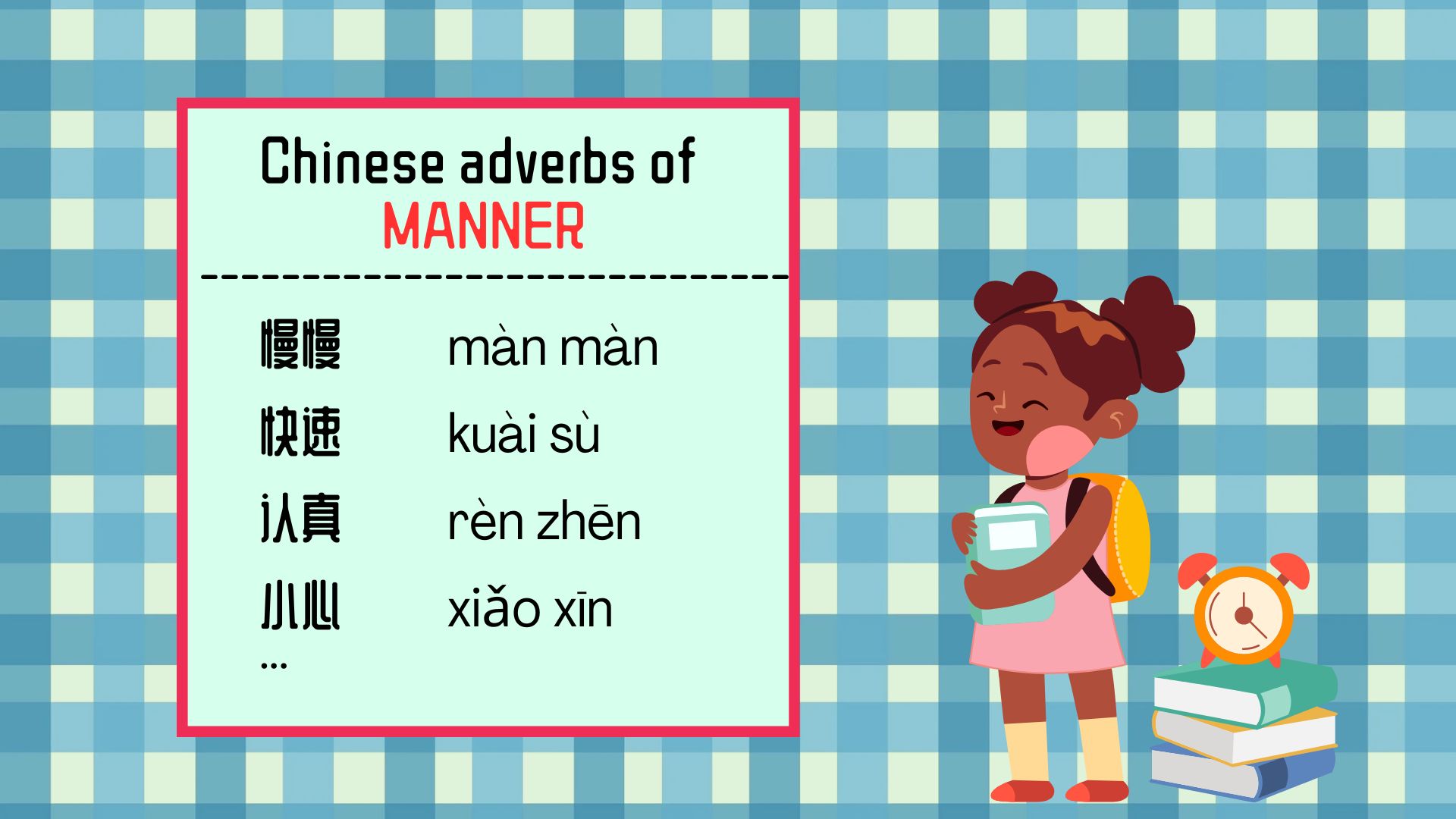
| Chinese | Pinyin | Meaning | Example Sentence |
| 慢慢 | màn màn | slowly | 他慢慢走回家。
Tā màn màn zǒu huí jiā. He walked home slowly. |
| 快速 | kuài sù | quickly | 她快速完成了作业。
Tā kuài sù wánchéng le zuòyè. She quickly finished her homework. |
| 认真 | rèn zhēn | seriously | 请认真听老师讲课。
Qǐng rènzhēn tīng lǎoshī jiǎngkè. Please listen carefully to the teacher. |
| 小心 | xiǎo xīn | carefully | 小心开车。
Xiǎoxīn kāichē. Drive carefully. |
| 突然 | tū rán | suddenly | 他突然出现了。
Tā tūrán chūxiàn le. He suddenly appeared. |
| 随便 | suí biàn | casually, randomly | 他随便回答了一个问题。
Tā suíbiàn huídá le yī gè wèntí. He answered casually. |
| 故意 | gù yì | deliberately, on purpose | 他故意打破了杯子。
Tā gùyì dǎpò le bēizi. He deliberately broke the cup. |
| 仔细 | zǐ xì | carefully, attentively | 她仔细检查了答案。
Tā zǐxì jiǎnchá le dá’àn. She checked the answers carefully. |
| 大声 | dà shēng | loudly | 他大声喊了出来。
Tā dàshēng hǎn le chūlái. He shouted loudly. |
| 悄悄 | qiāo qiāo | quietly, secretly | 他悄悄离开了房间。
Tā qiāoqiāo líkāi le fángjiān. He quietly left the room. |
| 勇敢地 | yǒng gǎn de | bravely | 他勇敢地面对挑战。
Tā yǒnggǎn de miànduì tiǎozhàn. He faced the challenge bravely. |
| 顺利地 | shùn lì de | smoothly, successfully | 活动顺利地结束了。
Huódòng shùnlì de jiéshù le. The event ended smoothly. |
| 激烈地 | jī liè de | intensely, fiercely | 他们激烈地讨论。
Tāmen jīliè de tǎolùn. They argued fiercely. |
| 平静地 | píng jìng de | calmly | 她平静地说话。
Tā píngjìng de shuōhuà. She spoke calmly. |
| 开心地 | kāi xīn de | happily | 孩子们开心地玩耍。
Háizimen kāixīn de wánshuǎ. The children played happily. |
Chinese adverbs of time
Adverbs of time (时间副词 shíjiān fùcí) indicate when an action happens. They help you set the timeline of events, whether in the past, present, or future.
| Chinese | Pinyin | Meaning | Example Sentence |
| 现在 | xiàn zài | now | 现在开始上课。
Xiànzài kāishǐ shàngkè. Class begins now. |
| 马上 | mǎ shàng | immediately | 他马上回来。
Tā mǎshàng huílái. He will come back immediately. |
| 已经 | yǐ jīng | already | 我已经吃过饭了。
Wǒ yǐjīng chī guo fàn le. I already ate. |
| 以前 | yǐ qián | before, previously | 他以前住在北京。
Tā yǐqián zhù zài Běijīng. He used to live in Beijing. |
| 以后 | yǐ hòu | after, later | 吃饭以后去散步。
Chīfàn yǐhòu qù sànbù. Take a walk after eating. |
| 曾经 | céng jīng | once, in the past | 我曾经见过他。
Wǒ céngjīng jiàn guo tā. I once met him. |
| 正在 | zhèng zài | currently, in the process | 他正在写作业。
Tā zhèngzài xiě zuòyè. He is doing homework right now. |
| 刚刚 | gāng gāng | just (a moment ago) | 他刚刚离开。
Tā gānggāng líkāi. He just left. |
| 立刻 | lì kè | right away | 请立刻回答。
Qǐng lìkè huídá. Please answer right away. |
| 暂时 | zàn shí | temporarily | 我暂时没有工作。
Wǒ zànshí méiyǒu gōngzuò. I’m not working temporarily. |
| 最近 | zuì jìn | recently | 我最近很忙。
Wǒ zuìjìn hěn máng. I’ve been busy recently. |
| 终于 | zhōng yú | finally | 他终于到了。
Tā zhōngyú dào le. He finally arrived. |
| 很久 | hěn jiǔ | for a long time | 我们很久地等待。
Wǒmen hěnjiǔ de děngdài. We waited for a long time. |
| 那时 | nà shí | at that time, then | 那时我还是学生。
Nàshí wǒ hái shì xuéshēng. At that time, I was still a student. |
| 将来 | jiāng lái | in the future | 将来我要去中国。
Jiānglái wǒ yào qù Zhōngguó. In the future, I will go to China. |
See also:
Chinese adverbs of place
Adverbs of place (处所副词 chùsuǒ fùcí) describe where an action takes place. They clarify the location or direction in a sentence.
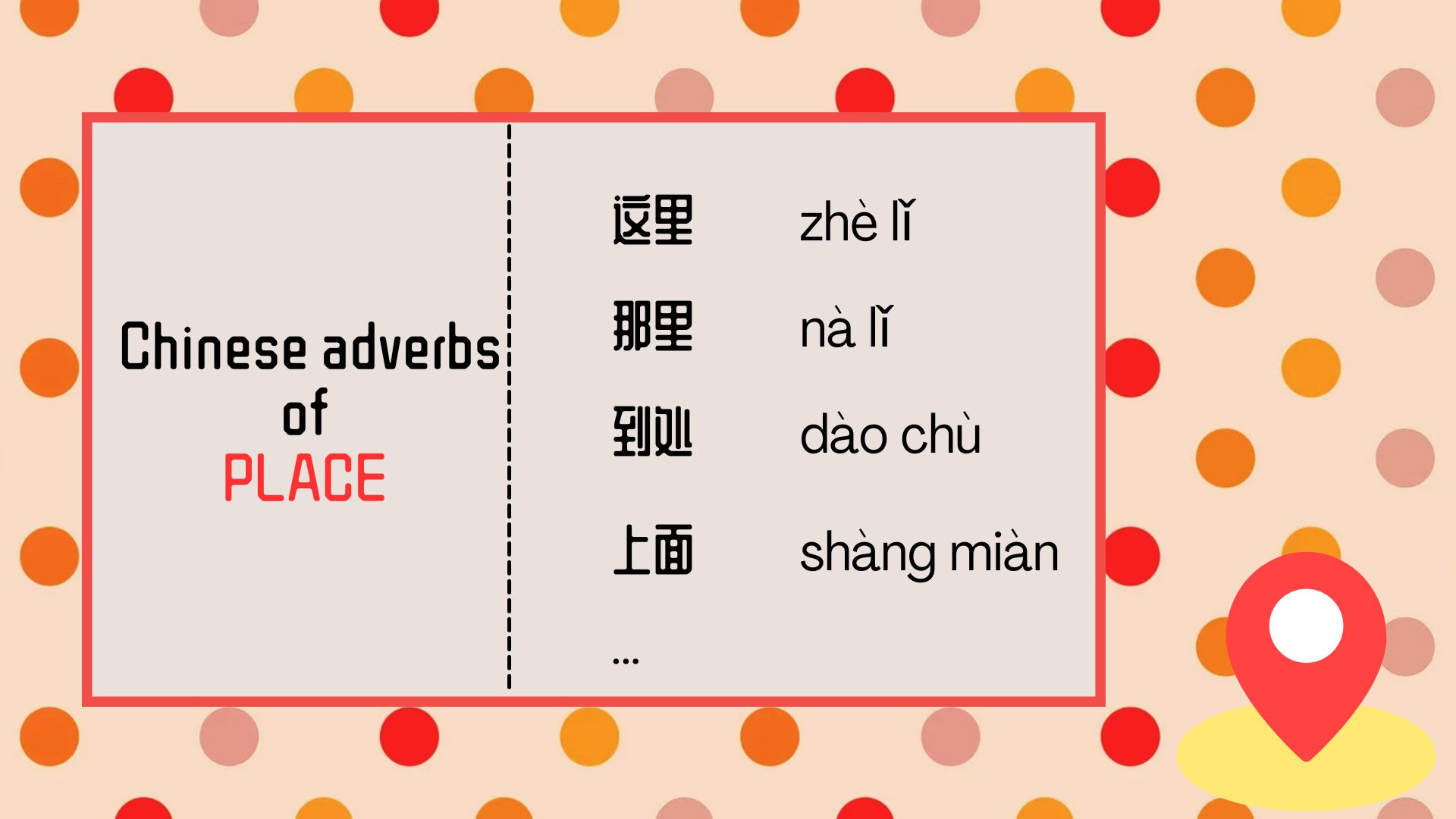
| Chinese | Pinyin | Meaning | Example Sentence |
| 这里 | zhè lǐ | here | 请坐在这里。
Qǐng zuò zài zhèlǐ. Please sit here. |
| 那里 | nà lǐ | there | 他在那里工作。
Tā zài nàlǐ gōngzuò. He works there. |
| 到处 | dào chù | everywhere | 花儿到处开放。
Huār dàochù kāifàng. Flowers bloom everywhere. |
| 上面 | shàng miàn | above, on top | 书在桌子上面。
Shū zài zhuōzi shàngmiàn. The book is on the table. |
| 下面 | xià miàn | below, under | 猫在桌子下面。
Māo zài zhuōzi xiàmiàn. The cat is under the table. |
| 里面 | lǐ miàn | inside | 钱包在包里面。
Qiánbāo zài bāo lǐmiàn. The wallet is inside the bag. |
| 外面 | wài miàn | outside | 他们在外面等。
Tāmen zài wàimiàn děng. They are waiting outside. |
| 前面 | qián miàn | in front | 商店在前面。
Shāngdiàn zài qiánmiàn. The shop is in front. |
| 后面 | hòu miàn | behind | 学校在后面。
Xuéxiào zài hòumiàn. The school is behind. |
| 中间 | zhōng jiān | in the middle | 桌子在房间中间。
Zhuōzi zài fángjiān zhōngjiān. The table is in the middle of the room. |
| 附近 | fù jìn | nearby | 学校附近有银行。
Xuéxiào fùjìn yǒu yínháng. There is a bank near the school. |
| 对面 | duì miàn | opposite | 银行在学校对面。
Yínháng zài xuéxiào duìmiàn. The bank is opposite the school. |
| 向前 | xiàng qián | forward | 请向前走。
Qǐng xiàngqián zǒu. Please walk forward. |
| 向后 | xiàng hòu | backward | 他向后退了一步。
Tā xiànghòu tuì le yī bù. He took a step backward. |
Chinese adverbs of frequency
Talking about habits? Chinese adverbs of frequency tell your listener exactly how often something happens – always, often, or barely ever.
| Chinese | Pinyin | Meaning | Example Sentence |
| 总是 | zǒng shì | always | 他总是很早起床。
Tā zǒngshì hěn zǎo qǐchuáng. He always gets up early. |
| 经常 | jīng cháng | often | 她经常去图书馆。
Tā jīngcháng qù túshūguǎn. She often goes to the library. |
| 常常 | cháng cháng | frequently | 我们常常一起吃饭。
Wǒmen chángcháng yīqǐ chīfàn. We often eat together. |
| 往往 | wǎng wǎng | often, tends to | 他往往忘记带钥匙。
Tā wǎngwǎng wàngjì dài yàoshi. He often forgets to bring his keys. |
| 有时 | yǒu shí | sometimes | 我有时会看电影。
Wǒ yǒushí huì kàn diànyǐng. I sometimes watch movies. |
| 偶尔 | ǒu ěr | occasionally | 她偶尔去跑步。
Tā ǒu’ěr qù pǎobù. She occasionally goes jogging. |
| 很少 | hěn shǎo | seldom | 他很少看电视。
Tā hěn shǎo kàn diànshì. He seldom watches TV. |
| 从不 | cóng bù | never | 我从不喝酒。
Wǒ cóng bù hē jiǔ. I never drink alcohol. |
| 一直 | yī zhí | continuously | 他一直在工作。
Tā yīzhí zài gōngzuò. He has been working continuously. |
| 不常 | bù cháng | not often | 我不常出门。
Wǒ bùcháng chūmén. I don’t go out often. |
| 每天 | měi tiān | every day | 他每天都锻炼。
Tā měitiān dōu duànliàn. He exercises every day. |
| 每周 | měi zhōu | every week | 我们每周开一次会。
Wǒmen měi zhōu kāi yī cì huì. We have a meeting every week. |
| 每月 | měi yuè | every month | 她每月去一次上海。
Tā měi yuè qù yī cì Shànghǎi. She goes to Shanghai once a month. |
| 每年 | měi nián | every year | 他们每年旅行一次。
Tāmen měi nián lǚxíng yī cì. They travel once a year. |
| 再三 | zài sān | repeatedly, again and again | 他再三强调这件事。
Tā zàisān qiángdiào zhè jiàn shì. He emphasized this matter repeatedly. |
Chinese adverbs of mood
Beyond facts, we also express doubt, certainty, surprise, or attitude. Chinese adverbs of mood carry that tone for you. They let your listener feel whether you are confident, hesitant, or simply adding emotion to the statement.
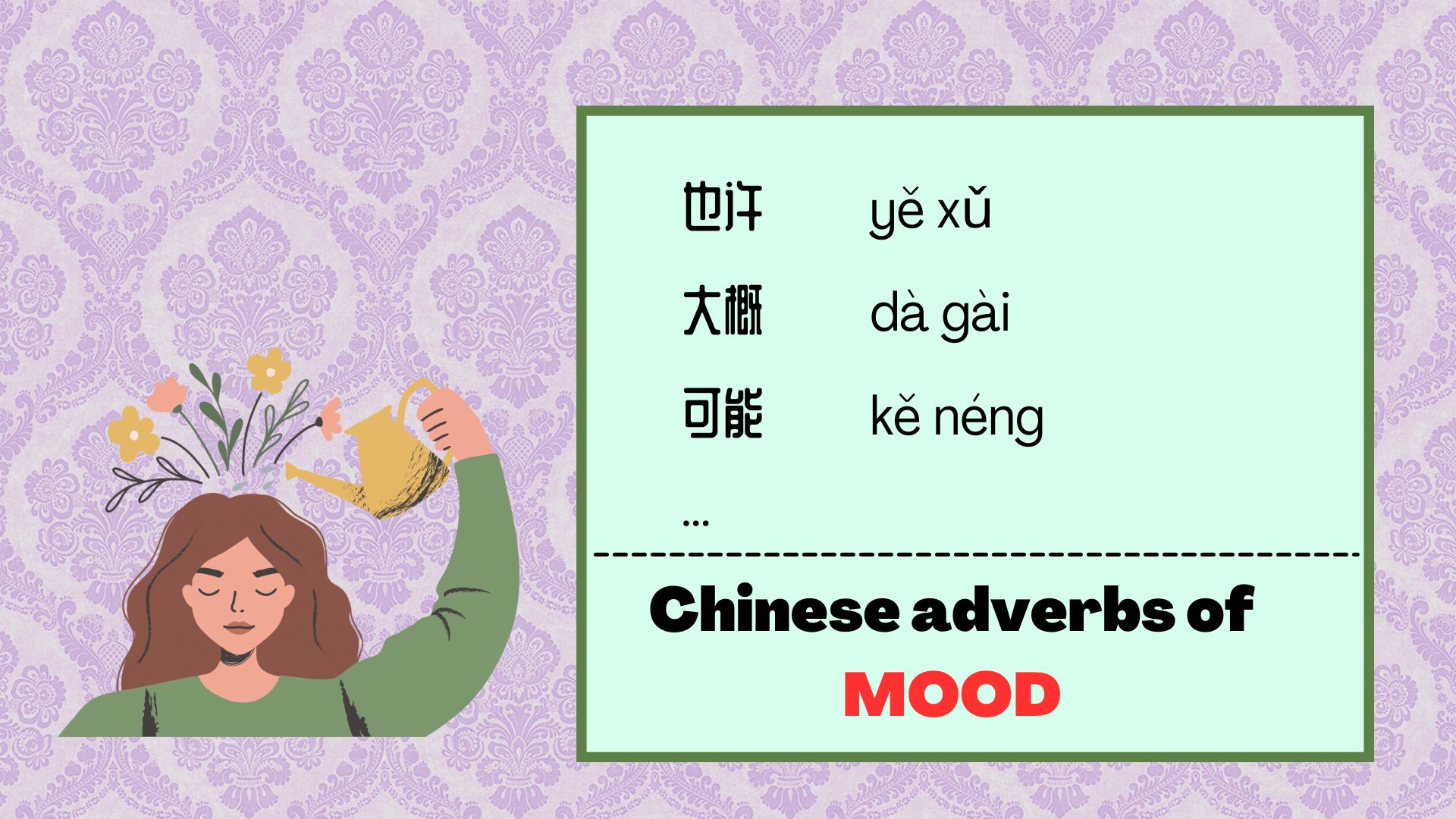
| Chinese | Pinyin | Meaning | Example Sentence |
| 也许 | yě xǔ | perhaps, maybe | 他也许会来。
Tā yěxǔ huì lái. He might come. |
| 大概 | dà gài | probably, roughly | 我大概知道答案。
Wǒ dàgài zhīdào dá’àn. I probably know the answer. |
| 可能 | kě néng | possibly, maybe | 今天可能下雨。
Jīntiān kěnéng xiàyǔ. It may rain today. |
| 一定 | yí dìng | definitely, surely | 她一定会成功。
Tā yídìng huì chénggōng. She will definitely succeed. |
| 偏偏 | piān piān | unfortunately, contrary to expectations | 我劝他别去,他偏偏要去。
Wǒ quàn tā bié qù, tā piānpiān yào qù. I told him not to go, but he insisted. |
| 幸好 | xìng hǎo | fortunately | 幸好你来了。
Xìnghǎo nǐ lái le. Fortunately, you came. |
| 果然 | guǒ rán | as expected | 他果然赢了。
Tā guǒrán yíng le. He won, just as expected. |
| 难道 | nán dào | could it be that… | 难道你不知道吗?
Nándào nǐ bù zhīdào ma? Could it be that you don’t know? |
| 居然 | jū rán | unexpectedly | 他居然忘了我的生日。
Tā jūrán wàng le wǒ de shēngrì. He unexpectedly forgot my birthday. |
| 偏要 | piān yào | insist on | 他偏要这么做。
Tā piān yào zhème zuò. He insists on doing it this way. |
| 好像 | hǎo xiàng | seem, appear | 她好像很高兴。
Tā hǎoxiàng hěn gāoxìng. She seems very happy. |
| 差点 | chà diǎn | almost, nearly | 我差点迟到了。
Wǒ chàdiǎn chídào le. I was almost late. |
| 果真 | guǒ zhēn | indeed, really | 他果真说对了。
Tā guǒzhēn shuō duì le. He was indeed correct. |
| 偏生 | piān shēng | unfortunately (dialect/less common) | 我叫他别说,他偏生说了。
Wǒ jiào tā bié shuō, tā piānshēng shuō le. I told him not to say it, but he said it anyway. |
| 未必 | wèi bì | not necessarily | 他的话未必是真的。
Tā de huà wèibì shì zhēn de. What he said is not necessarily true. |
Chinese adverbs of degree
Sometimes it’s not just about what happens but how much or to what extent. Chinese adverbs of degree add intensity, showing whether something is a little, very, or absolutely extreme. They make your sentences precise and expressive.
| Chinese | Pinyin | Meaning | Example Sentence |
| 很 | hěn | very | 他很高兴。
Tā hěn gāoxìng. He is very happy. |
| 非常 | fēi cháng | extremely | 她非常聪明。
Tā fēicháng cōngmíng. She is extremely smart. |
| 太 | tài | too, overly | 这件衣服太大了。
Zhè jiàn yīfu tài dà le. This piece of clothing is too big. |
| 特别 | tè bié | especially, particularly | 我特别喜欢音乐。
Wǒ tèbié xǐhuān yīnyuè. I especially like music. |
| 相当 | xiāng dāng | quite, considerably | 这道题相当难。
Zhè dào tí xiāngdāng nán. This question is quite difficult. |
| 十分 | shí fēn | very, utterly | 他十分认真。
Tā shífēn rènzhēn. He is very serious. |
| 极其 | jí qí | extremely | 天气极其寒冷。
Tiānqì jíqí hánlěng. The weather is extremely cold. |
| 格外 | gé wài | especially, particularly | 她今天格外高兴。
Tā jīntiān géwài gāoxìng. She is especially happy today. |
| 完全 | wán quán | completely | 我完全同意。
Wǒ wánquán tóngyì. I completely agree. |
| 特别地 | tè bié de | exceptionally | 他特别地小心。
Tā tèbié de xiǎoxīn. He was exceptionally careful. |
| 充分 | chōng fèn | fully | 他充分理解了问题。
Tā chōngfèn lǐjiě le wèntí. He fully understood the problem. |
| 极大地 | jí dà de | greatly | 这极大地影响了结果。
Zhè jídà de yǐngxiǎng le jiéguǒ. This greatly affected the result. |
| 非常地 | fēi cháng de | very, exceedingly | 他非常地努力。
Tā fēicháng de nǔlì. He worked very hard. |
| 颇 | pō | rather, quite | 他颇有经验。
Tā pō yǒu jīngyàn. He is quite experienced. |
| 略微 | lüè wēi | slightly | 他略微点头。
Tā lüèwēi diǎntóu. He nodded slightly. |
Conjunctive adverbs
When sentences need connection, conjunctive adverbs (连接副词 liánjiē fùcí) act as bridges. They link ideas, show contrast, or add cause-and-effect, making your Mandarin flow smoothly like natural speech.
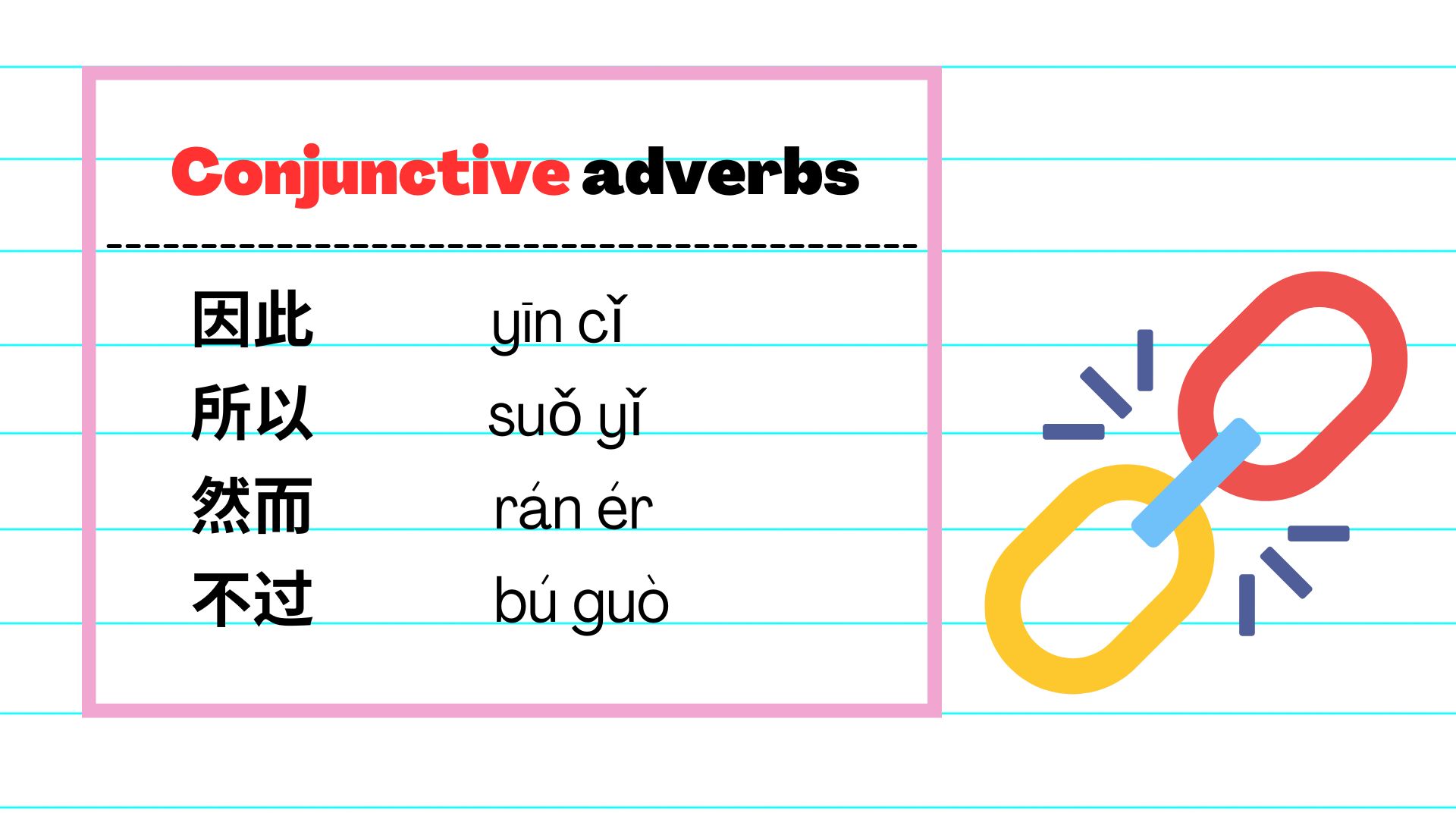
| Chinese | Pinyin | Meaning | Example Sentence |
| 因此 | yīn cǐ | therefore, thus | 他生病了,因此没来。
Tā shēngbìng le, yīncǐ méi lái. He was sick, therefore he didn’t come. |
| 所以 | suǒ yǐ | so, hence | 下雨了,所以我们不去。
Xiàyǔ le, suǒyǐ wǒmen bù qù. It’s raining, so we’re not going. |
| 然而 | rán ér | however, yet | 他很努力,然而失败了。
Tā hěn nǔlì, rán’ér shībài le. He worked hard, yet failed. |
| 不过 | bú guò | however, but | 这很贵,不过值得。
Zhè hěn guì, bùguò zhídé. It’s expensive, but worth it. |
| 于是 | yú shì | so, then | 他迟到了,于是老师很生气。
Tā chídào le, yúshì lǎoshī hěn shēngqì. He was late, so the teacher got angry. |
| 同时 | tóng shí | at the same time | 他学习,同时也工作。
Tā xuéxí, tóngshí yě gōngzuò. He studies and works at the same time. |
| 而且 | ér qiě | moreover, besides | 她聪明,而且很努力。
Tā cōngmíng, érqiě hěn nǔlì. She is smart and also hardworking. |
| 不但 | bú dàn | not only | 他不但会说中文,还会说日文。
Tā bùdàn huì shuō Zhōngwén, hái huì shuō Rìwén. He can speak not only Chinese but also Japanese. |
| 再说 | zài shuō | besides, moreover | 我不想去,再说太晚了。
Wǒ bù xiǎng qù, zàishuō tài wǎn le. I don’t want to go; besides, it’s too late. |
| 因而 | yīn ér | thus, as a result | 他很努力,因而成功了。
Tā hěn nǔlì, yīn’ér chénggōng le. He worked hard, thus succeeded. |
Notes on using Chinese adverbs
To use Chinese adverbs correctly, placement is just as important as meaning. Word order matters in Mandarin, and the wrong position can make a sentence sound unnatural. Here are two essential rules to remember:
Position rule
The table below summarizes the common positions of major adverb types:
| Adverb Type | Common Position | Example |
| Time | At the beginning of the sentence, or before the verb | 昨天他去北京。
Zuótiān tā qù Běijīng. He went to Beijing yesterday. |
| Frequency | Before the main verb | 我经常去图书馆。
Wǒ jīngcháng qù túshūguǎn. I often go to the library. |
| Place | After the verb, or within a location phrase (在 + place) | 他在家学习。
Tā zài jiā xuéxí. He studies at home. |
| Manner | Before or after the verb | 他慢慢地走进房间。
Tā mànmàn de zǒu jìn fángjiān. He slowly walked into the room. |
| Degree | Before adjectives or verbs | 她非常高兴。
Tā fēicháng gāoxìng. She is extremely happy. |
| Mood | At the beginning, or before the verb | 也许他今天不来。
Yěxǔ tā jīntiān bù lái. Maybe he won’t come today. |
| Conjunctive | At the start or between two clauses to link ideas | 他很努力,因此成功了。
Tā hěn nǔlì, yīncǐ chénggōng le. He worked hard; therefore, he succeeded. |
Rule of multiple adverbs
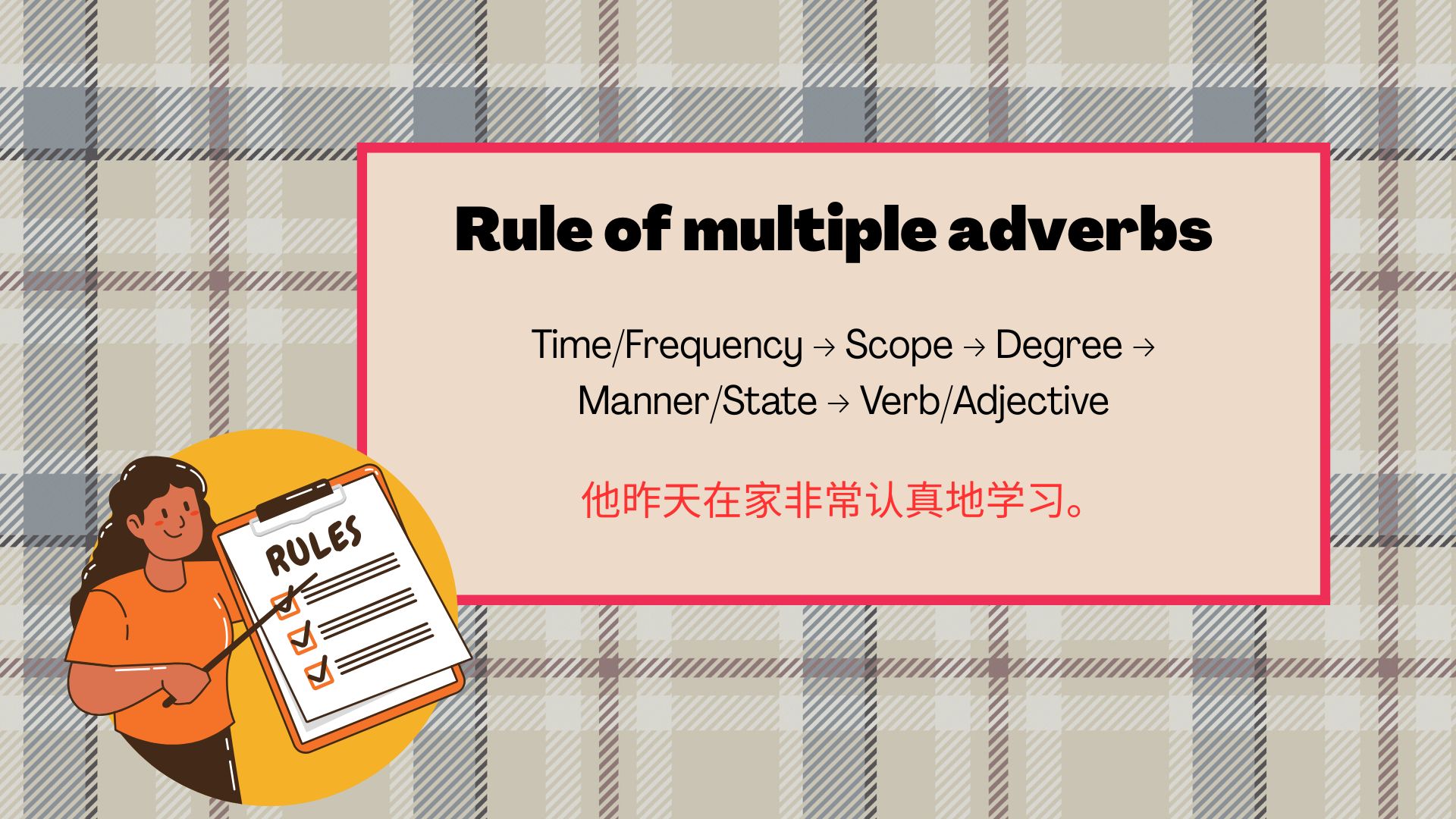
When more than one adverb appears, Mandarin follows a fixed sequence:
Time/Frequency → Scope → Degree → Manner/State → Verb/Adjective
For example:
他昨天在家非常认真地学习。
Tā zuótiān zài jiā fēicháng rènzhēn de xuéxí.
He studied very seriously at home yesterday.
See also:
Conclusion
Chinese adverbs may look like small words, but they shape how clear and natural your Mandarin sounds. Once you know how to use them for time, place, mood, and more, your sentences stop sounding flat and start carrying real meaning. Keep them in your active vocabulary, and you’ll feel the difference in daily conversations.
Continue your progress with structured lessons at Gurulango and take your Mandarin to the next level.
FAQs
- Do adverbs go before or after the verb in Chinese?
Most Chinese adverbs are placed before the main verb. For example:
我常常去图书馆
Wǒ chángcháng qù túshūguǎn.
I often go to the library.
- What’s the difference between 不 (bù) and 没 (méi) as adverbs?
不 (bù) negates present or future actions, habits, or general facts. Example: 我不喝茶 (Wǒ bù hē chá. I don’t drink tea).
没 (méi) negates past actions or completed events. Example: 我昨天没去 (Wǒ zuótiān méi qù. I didn’t go yesterday).
- How do you use the particle 地 (de) to form adverbs?
The particle 地 (de) links an adverb to the verb it modifies, similar to “-ly” in English. Structure: Adverb + 地 + Verb. Example: 他认真地学习 (Tā rènzhēn de xuéxí. He studies seriously).
- What is ABAB in Chinese?
ABAB is a reduplication pattern where a disyllabic verb or adjective (AB) is repeated (ABAB) to soften tone, show repetition, or create a casual style. Example: 讨论讨论 (tǎolùn tǎolùn), 休息休息 (xiūxi xiūxi).